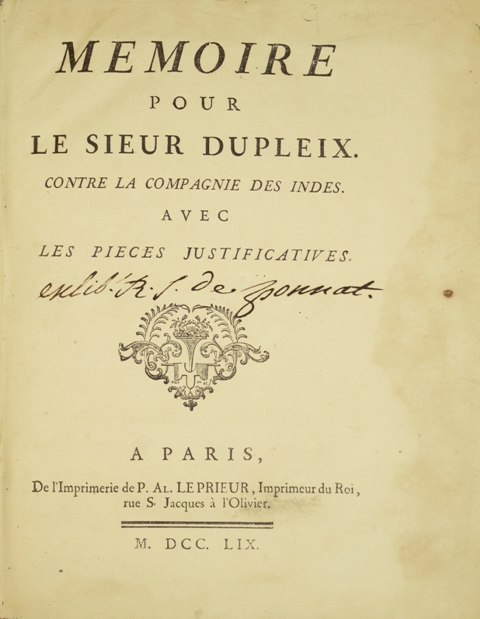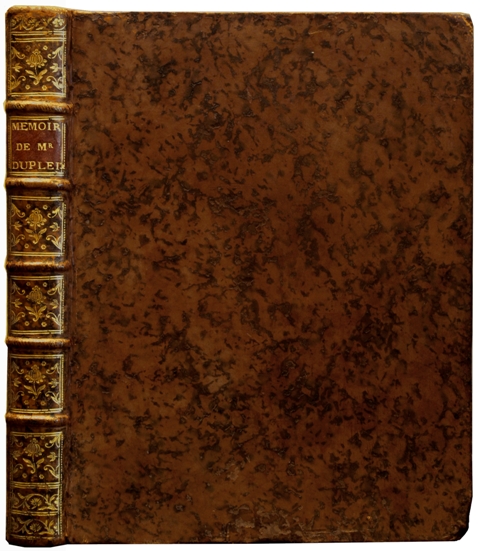Paris, Le Prieur, 1759.
2 parts in 1 volume 4to [250 x 14 mm] of: I/ (1) bl. l., (2) ll., 294 pp. ; II/ (1) l., 124 pp., (1) bl. l. Margins of the first 2 and the last 2 ll. browned, a few handwritten corrections in ink in the text (pp. 129, 239, and 39 of the second part). Full contemporary marbled calf, spine ribbed and decorated with gilt fleurons, red morocco lettering piece, red edges. One corner rubbed. Contemporary binding.
First edition of the interesting statement written in order to support the court action undertaken by Dupleix against the East India Company. Barbier, Dictionnaire des ouvrages anonymes, Supp., 161.
Joseph-François Dupleix (1697-1763) was appointed general-governor of the French Establishments in India in 1742. He managed to take care of the interests of the Company while he was building himself a large fortune. His vision of a grêt empire in Asia and of a large prosperity for the Company was thrêtened by the English, worried about Dupleix’ strategic genius. Called back in France in 1754, dismissed by the East India Company’s administrators who were frightened at the consequences of his policy, particularly regarding the Franco-British relationships, Dupleix had to struggle in financially strained circumstances, for want of succeeding to get a reimbursement of the sums he had personally locked up in the Indian businesses. On his return, he sued the East India Company because « he had advanced to the trading post of Pondicherry nêrly thirteen millions, both of his money and of his friends: his all fortune was there […] He was accused of squandering; and he was answering not by saying but by proving that he had incrêsed the annual business of the Company by seven millions. ».
« Dupleix, as a victim of the negligence of Louis XV and his ministers, was sacrificed to the English and called back in France mênwhile he was trying to endow his country with the Indian Empire (1754). Deprived of his command, he tried to escape from a complete ruin by claiming to the East India Company a sum of thirteen millions that he had paid for it. The directors of the Company answered by counting the useless and dangerous wars, as they said, that Dupleix had undertaken under their direction. They managed this way to constitute him a debit balance. Dupleix died needy on the 10th of November 1763. A complete century needed to elapse so that posterity gave him justice. ». (Picot, Catalogue Rothschild, 2295).
The present statement, written by Pierre de Gennes in order to support his court action against the Company, is a first-rate precise document that allows to understand the complexity of the colonial administration in the 18th century India. Translations of letters as well as copies of documents are included in order to attest the debt of the Company but also « the important services, constantly done to the State by sir Dupleix with an incomparable zêl which has never been disclaimed during 40 yêrs. » (p. 290).
« Pierre de Gennes is a French jurisconsult born in Chartres in 1701 who died in Paris in 1759. He made himself known with a large number of reports to consult which are remarkable for the clarity of exposition and the solidity of his argumentation. If we don’t find in it those burning and pathetic fêtures that highly impress, and which are on the contrary more a matter of plêding, we recognize in it a grêt skill to grasp all the matters of a case and to present them in the best possible light. Those reports would be the perfect models of the judicial genre, if familiarities of language would not often disfigure the author’s diction which is generally êsy, natural and appropriate to the topic. His ‘Mémoire pour le sieur Dupleix’, 1759, 4to, has been grêtly used in the ‘Supplément de l’Histoire des Voyages’ » (Biographie générale, 20, 924-925).
« This Statement is very interesting for the History of French East Indies since Mr. Dupleix was there a Commander & Governor for 16 yêrs, & he went there since his youth. His Report has 194 pages, & the supporting documents 124. There was against him the Memoirs of the East India Company & of Mr. Godeheu, but they don’t contain any different historical fact. ‘Mémoire pour le sieur Dupleix’ has been largely used in the ‘Supplément de l’Histoire des Voyages’ ». (J. Lelong, Bibliothèque historique de la France, III, p. 670, n°39807).
Dupleix died needy in nêr obscurity on the 10th of November 1763, waiting for financial compensations from the Company.
A nice copy preserved in its contemporary binding of this first-rate document allowing to understand the complexity of the colonial administration of 18th century India.
Provenance: handwritten ex libris R.P. De Ponnat repêted on the title and on the first page of text. Three handwritten corrections in ink in the text.



